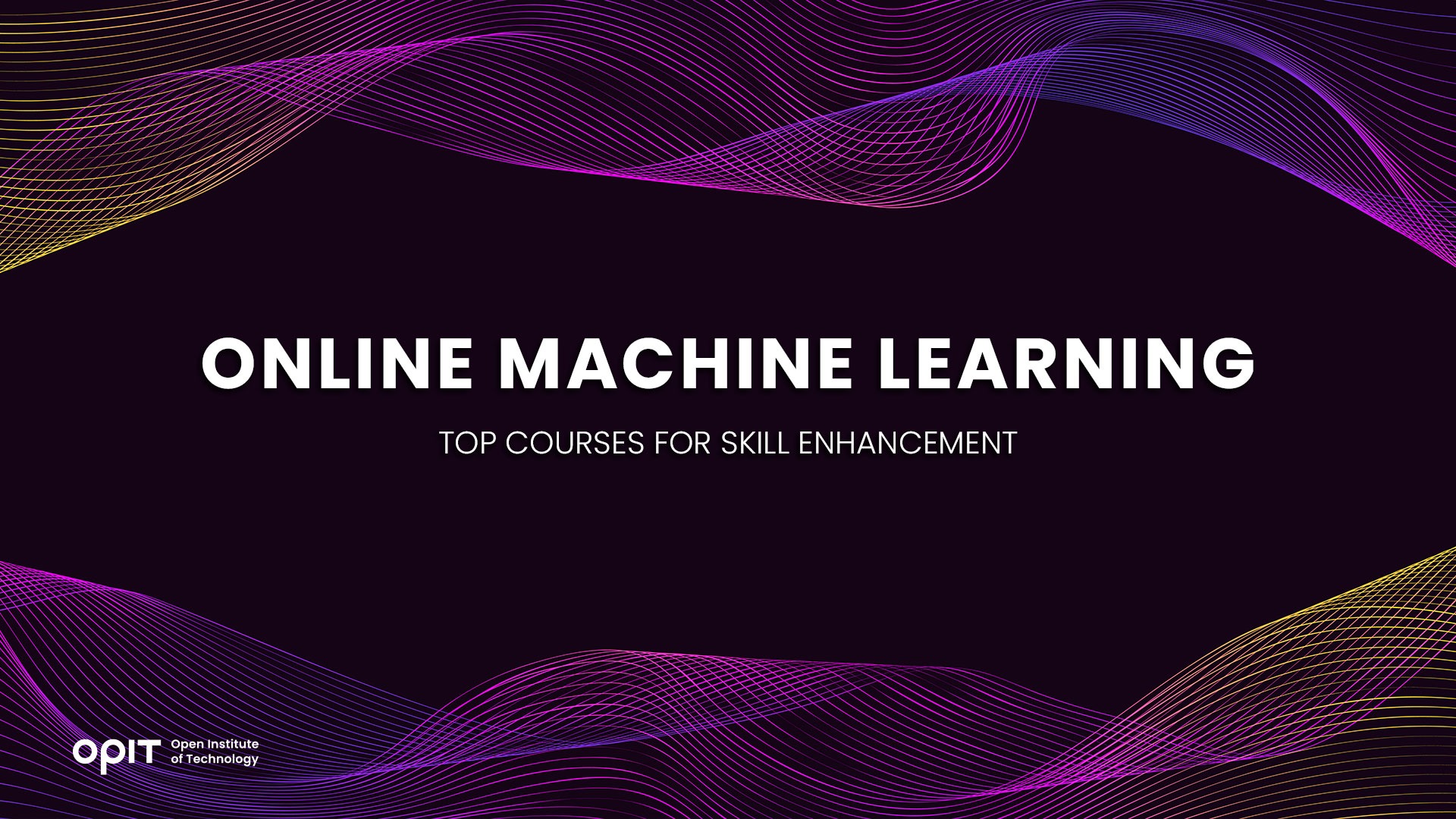

Once a concept found exclusively in science fiction, machine learning has seen widespread use in the modern age. As soon as various industries grasped the potential of ML, this field of computer science turned into a staple of tech and other businesses.
Naturally, all this has led to an increased demand for machine learning experts. The job market abounds with offers for positions in the field, and the competition is fierce. In other words, you may find plenty of job openings for machine learning professionals, but you’ll need to fit the bill to actually land the position.
Fortunately, there are plenty of online machine learning courses to give you the needed expertise and boost your skills. This article will help you find the best machine learning course online and explain the top options in detail.
Factors to Consider When Choosing an Online Machine Learning Course
If you like the idea of online learning, machine learning courses are readily available. In fact, the number of options may be overwhelming. That’s why we’ve applied certain strict criteria when looking for the best machine learning online course. Moving forward, you should also keep those criteria in mind.
Firstly, the content of the course will matter the most. Machine learning is a broad field, and you’ll want to ensure that the education you’re getting is the one you need. Also, every genuine venue of machine learning online training should give you a solid foundation while placing a particular emphasis to specific skills.
The curriculum won’t be the only aspect of the course that matters, though. Who is teaching you will be crucial as well. Ideally, your instructor should be an experienced professional in the field so that they can teach you the theory as well as the practical applications.
Next, one of the primary reasons why you’d want to take a course rather than enroll into a BSc or MSc program is time. You don’t want a course to take up too much of your time, which is why flexibility and the overall duration are essential. You’ll want a well-structured online machine learning course that will leave room for a job or any other activities.
Beside the knowledge provided, hands-on experience will be vital. Once you complete a course, you should be able to apply everything you’ve learned there. To that end, a quality machine learning online course will focus heavily on the real-world application of the skills taught.
Finally, the pricing will play a major role. Similar to time, budgetary concerns are likely a core reason why you’re opting for a course. Simply put, you don’t want it to cost the same as a year at a university. And if the price is somewhat higher, the course should provide plenty of additional resources to justify it.
Top Online Machine Learning Courses
Imperial College Business School – Professional Certificate in Machine Learning and Artificial Intelligence
Course Overview
This program deals with the essential AI and machine learning concepts, teaching you when and how ML solutions can be applied to real-life problems. The course is relatively long, lasting for 25 weeks. It was developed in collaboration with the Imperial College’s Department of Computing.
Key Features
- Taught by experts
- Hands-on activities
- Projects worthy of your portfolio
- Ends with a capstone project
- Verified digital certificate
Pricing and Additional Resources
The price of this course is £3,995, which is reasonable considering its extended duration. During the course, you’ll have individual advisor support for career-building. Completing your studies will also grant you the status of an Associate Alumni, allowing you to join the Imperial College Business School’s community.
Google Digital Garage – Machine Learning Crash Course
Course Overview
If you want to learn machine learning fundamentals quickly and efficiently, this course is just the ticket. It includes comprehensive text and video lectures, practical exercises, and work with the TensorFlow ML library. You’ll gain relevant knowledge and experience through three modules lasting a total of 15 hours.
Key Features
- Lecturers are Google’s researchers
- Intermediate level
- Genuine case studies
- Interactive algorithm showcases
- Fast-paced and applicable
Pricing and Additional Resources
If you’re wondering how much a course from a leading tech giant company may cost, you’ll be pleasantly surprised: This Google machine learning online course is absolutely free. In addition, it’s quite short and very efficient.
IBM (via edX) – Machine Learning With Python: A Practical Introduction
Course Overview
This course teaches you supervised and unsupervised machine learning using Python. An introductory course, it may last up to five weeks. Best of all, the program is entirely self-paced, meaning you can tackle individual lessons at a tempo that suits you. It’s worth noting that this course also explores widely used models and algorithms, supported by actual examples.
Key Features
- Taught by a Senior Data Scientists at IBM
- Part of IBM’s one year certificate program for data science professionals
- Beginner-friendly
- Focus on statistics and data analysis
Pricing and Additional Resources
Like Google’s course, this program by IBM, hosted on edX, is free. It’s worth noting that there’s also a “Verified Track” version, priced on edX at $99. This version of the course will provide unlimited source material access, exams, graded assignments, and a shareable certificate.
DeepLearning.AI (via Coursera) – Unsupervised Learning, Recommenders, Reinforcement Learning
Course Overview
As a part of a specialization in machine learning, this course teaches unsupervised learning as a particular branch of ML. You’ll also learn about recommender systems and how to build certain machine learning models. The course is designed by experienced DeepLearning.AI members in collaboration with Stanford University. You’ll be able to complete it in about 27 hours.
Key Features
- Flexible course scheduling
- Part of a three-course specialization
- Taught by an experienced lecturer and ML professional
- Beginner-friendly
- Teaches specific machine learning techniques
Pricing and Additional Resources
This course, as well as the entire specialization, is available with a Coursera subscription. As a subscriber, you won’t pay any additional fees for the course. Plus, you’ll gain access to a shareable certificate, practice and graded quizzes, and other subscriber benefits.
Microsoft – Foundations of Data Science for Machine Learning
Course Overview
More than a regular course, Foundations of Data Science for Machine Learning is a learning path which consists of 14 modules. It will take you through the entire journey, from the machine learning basics to advanced architecture and data analysis. The course can be completed in under 13 hours.
Key Features
- Offered by a leading tech giant
- Provides lessons and exercises
- Entirely browser-based
- Interactive learning
Pricing and Additional Resources
This training course by Microsoft is free and available immediately. Enrolling in the course comes with no prerequisites.
Tips for Success in Online Machine Learning Courses
Once you choose a machine learning online course, simply signing up for it won’t be enough. You’ll want to ensure you’re getting the most value out of the program. To that end, it would be best to apply the following tips:
- Set your goals and expectations: The best way to get optimal results from a course is to go into it knowing precisely what you want. Clarify what you’re looking to achieve and what you expect the course to provide, and you’ll have an easier time both choosing and completing the program.
- Dedicate time to study and practice: Course lectures will be a vital part of the learning process, but the time and work you put into it will be what makes it all worthwhile. Approach your machine learning online course with the utmost dedication and responsibility, making sure to always set aside the time of day for studying.
- Engage with the community: A learning environment is perfect for building a network. You’ll contact other people with similar interests, which may broaden your viewpoint, provide additional knowledge, and even open up job opportunities. Don’t shy away from online forums or any other type of meeting place that your peers frequent.
- Try out new skills and concepts in real-life: Even if the course you pick involves practical projects, you should be proactive beyond that point. Take what you’ve learned and try to apply it on something outside the course. The best time to start practicing is as soon as you learn a new skill.
- Keep updating your knowledge and skills: Machine learning progresses rapidly, so you’ll have to do your best in keeping your knowledge and skills relevant. A quality course will give you a good foundation. However, updating what you’ve learned will be entirely up to you.
Become a Machine Learning Expert Online
If you’ve found the best machine learning course online for your purposes, you should start learning right away. Armed with the proper skills, you’ll have greater chances of getting work in the industry and starting a career in this science of the future.
Explore which machine learning online course fits you best and start pursuing your goals. You’ll find the knowledge and experience gained as the perfect catalysts for personal and professional growth.
Related posts

Source:
- EFMD Global, Published on July 12th, 2024.
By Stephanie Mullins
Many people love to read the stories of successful business school graduates to see what they’ve achieved using the lessons, insights and connections from the programmes they’ve studied. We speak to one alumnus, Riccardo Ocleppo, who studied at top business schools including London Business School (LBS) and INSEAD, about the education institution called OPIT which he created after business school.
Please introduce yourself and your career to date.
I am the founder of OPIT — Open Institute of Technology, a fully accredited Higher Education Institution (HEI) under the European Qualification Framework (EQF) by the MFHEA Authority. OPIT also partners with WES (World Education Services), a trusted non-profit providing verified education credential assessments (ECA) in the US and Canada for foreign degrees and certificates.
Prior to founding OPIT, I established Docsity, a global community boasting 15 million registered university students worldwide and partnerships with over 250 Universities and Business Schools. My academic background includes an MSc in Electronics from Politecnico di Torino and an MSc in Management from London Business School.
Why did you decide to create OPIT Open Institute of Technology?
Higher education has a profound impact on people’s futures. Through quality higher education, people can aspire to a better and more fulfilling future.
The mission behind OPIT is to democratise access to high-quality higher education in the fields that will be in high demand in the coming decades: Computer Science, Artificial Intelligence, Data Science, Cybersecurity, and Digital Innovation.
Since launching my first company in the education field, I’ve engaged with countless students, partnered with hundreds of universities, and collaborated with professors and companies. Through these interactions, I’ve observed a gap between traditional university curricula and the skills demanded by today’s job market, particularly in Computer Science and Technology.
I founded OPIT to bridge this gap by modernising education, making it affordable, and enhancing the digital learning experience. By collaborating with international professors and forging solid relationships with global companies, we are creating a dynamic online community and developing high-quality digital learning content. This approach ensures our students benefit from a flexible, cutting-edge, and stress-free learning environment.
Why do you think an education in tech is relevant in today’s business landscape?

As depicted by the World Economic Forum’s “Future of Jobs 2023” report, the demand for skilled tech professionals remains (and will remain) robust across industries, driven by the critical role of advanced technologies in business success.
Today’s companies require individuals who can innovate and execute complex solutions. A degree in fields like computer science, cybersecurity, data science, digital business or AI equips graduates with essential skills to thrive in this dynamic industry.
According to the International Monetary Fund (IMF), the global tech talent shortage will exceed 85 million workers by 2030. The Korn Ferry Institute warns that this gap could result in hundreds of billions in lost revenue across the US, Europe, and Asia.
To address this challenge, OPIT aims to democratise access to technology education. Our competency-based and applied approach, coupled with a flexible online learning experience, empowers students to progress at their own pace, demonstrating their skills as they advance.
Read the full article below:

Source:
- The European, Summer 2024 Edition, Page 24
With careful planning, ethical considerations, and ensuring human oversight is maintained, AI can have huge market research benefits, says Lorenzo Livi of the Open Institute of Technology.
By Lorenzo Livi
To market well, you need to get something interesting in front of those who are interested. That takes a lot of thinking, a lot of work, and a whole bunch of research. But what if the bulk of that thinking, work and research could be done for you? What would that mean for marketing as an industry, and market research specifically?
With the recent explosion of AI onto the world stage, big changes are coming in the marketing industry. But will AI be able to do market research as successfully? Simply, the answer is yes. A big, fat, resounding yes. In fact, AI has the potential to revolutionise market research.
Ensuring that people have a clear understanding of what exactly AI is is crucial, given its seismic effect on our world. Common questions that even occur amongst people at the forefront of marketing, such as, “Who invented AI?” or, “Where is the main AI system located?” highlight a widespread misunderstanding about the nature of AI.
As for the notion of a central “main thing” running AI, it’s essential to clarify that AI systems exist in various forms and locations. AI algorithms and models can run on individual computers, servers, or even specialized hardware designed for AI processing, commonly referred to as AI chips. These systems can be distributed across multiple locations, including data centres, cloud platforms, and edge devices. They can also be used anywhere, so long as you have a compatible device and an internet connection.
While the concept of AI may seem abstract or mysterious to some, it’s important to approach it with a clear understanding of its principles and applications. By promoting education and awareness about AI, we can dispel misconceptions and facilitate meaningful conversations about its role in society.
Read the full article below:
- The European, Pages 24 to 26.
Have questions?
Visit our FAQ page or get in touch with us!
Write us at +39 335 576 0263
Get in touch at hello@opit.com
Talk to one of our Study Advisors
We are international
We can speak in:


